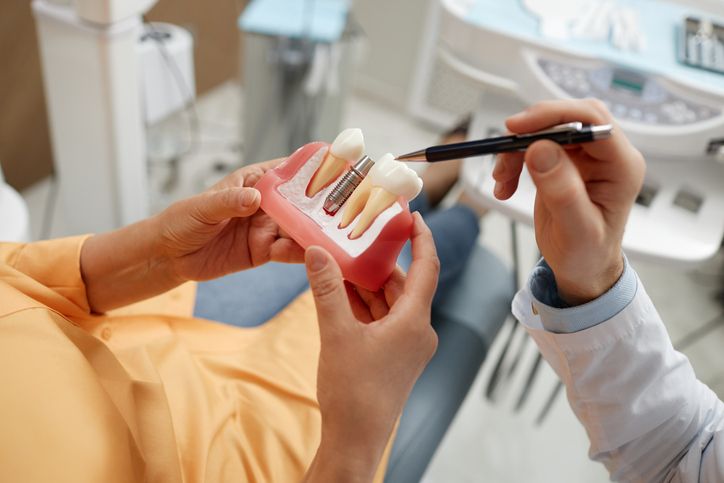The Lifespan of Dental Crowns & Bridges

Whether you need a dental crown or bridge for cosmetic reasons or to restore damaged teeth, it's important to understand their lifespan and how to care for them.
At Severns Dentistry & Orthodontics, our team of experienced cosmetic dentists and orthodontists strive to provide quality care and convenience for patients of all ages.
What to Expect When Getting Dental Crown
The process of getting a dental crown at Severns Dentistry & Orthodontics generally requires two visits. During your first appointment, your dentist will remove decay and any damaged areas on the tooth. They will then take impressions, which will be used to create your custom crown. We place a temporary crown in the meantime while your permanent one is being made. During your second visit with us, we will remove your temporary crown. Once that is complete, we will bond your permanent crown in place, ensuring a proper fit and natural appearance.
How long do dental crowns last?
Dental crowns are an attractive and effective solution for restoring damaged teeth and also improve the appearance of misshapen or discolored teeth. But just like any other dental treatment, you may wonder how long these custom-made caps will last.
With proper care, dental crowns can last anywhere between 5 and 15 years, depending on various factors such as your oral hygiene habits, what the crown is made of, and regular dental check-ups. Some crowns, like those made from porcelain or ceramic, tend to last longer than others.
However, you can significantly extend your dental crown's lifespan with proper care and maintenance.
Tips for Caring for Dental Crowns to Make Them Last Longer
There are a variety of ways to care for your dental crowns to ensure they last, including:
Keep up your good oral hygiene habits: Brush your teeth twice daily and floss daily to remove and prevent plaque and bacteria buildup, which can weaken or ruin the bond between the crown and the tooth.
Avoid sticky/crunchy/hard foods: These types of foods can cause damage to your crowns and may even dislodge them.
Wear a mouthguard/nightguard: If you clench or grind your teeth while sleeping, wearing a mouthguard can prevent damage to your crowns.
Schedule regular dental check-ups: Regular visits to your cosmetic dentist in McMurray will ensure that your crowns are in good condition and identify potential issues before they become more serious.
Avoid using your teeth as tools: Using them to open packages or bottles can put unnecessary pressure on your crowns, causing them to crack or break.
Following these simple tips, you can make your dental crowns last longer and maintain a healthy, beautiful smile for years.
The Process of Getting a Dental Bridge
Getting a dental bridge typically requires two or more visits to our office. During your first visit, we will prepare the adjacent teeth by removing a small amount of enamel to make room for the crowns that will support the bridge. Impressions will be taken off the area where the crown will go and sent to a dental lab where your custom-made bridge will be created.
On your second visit, we will ensure that the bridge fits properly and then bond it in place using a special dental adhesive.
The Longevity of Dental Bridges
The lifespan of dental bridges can vary, but on average, they may last between 5 to 15 years. To extend your dental bridges' lifespan, taking good care of them is essential. Here are a few tips to help you keep your bridges in excellent condition:
Clean your bridges regularly: Use a floss threader or interdental brush to clean around and under your bridges, as plaque buildup can cause decay and damage to the supporting teeth.
Avoid hard or sticky foods: Just like with dental crowns, it is essential to avoid hard or sticky foods that may cause damage to your bridges.
Keep up with regular check-ups: Regular visits to your cosmetic dentist in McMurray will ensure that your bridges are functioning correctly and identify any potential issues early on.
Consider using a water flosser: This can help clean hard-to-reach areas around your bridges, freeing them from plaque and bacteria buildup.
By following these tips, you can extend the lifespan of your dental bridges and maintain a healthy, functional smile.
Am I a Candidate for a Bridge?
Dental bridges offer an excellent solution for restoring your smile if you have missing teeth. However, it's crucial to consult with your cosmetic dentist or orthodontist to determine if you are a suitable candidate for this treatment. Factors such as the condition of your remaining teeth and overall oral health will be evaluated to determine the best course of action for replacing your missing teeth.
What happens if my crown or my bridge becomes damaged?
If your dental crown or bridge becomes damaged, it's critical to seek dental care as soon as possible. Ignoring the issue can lead to more serious problems and may require more extensive treatment. Contact our team immediately if you experience discomfort or notice damage to your crown or bridge.
Call For An Appointment Today!
At Severns Dentistry & Orthodontics, we understand the importance of quality care and convenience for our patients. Our team is dedicated to providing professional yet approachable dental services for patients of all ages. Contact us today to schedule an appointment!

Author:
Natalie Severns, DMD
Upon graduating from the University of Pittsburgh School of Dental Medicine, Dr. Severns specialized in Orthodontics and Dentofacial Orthopedics at the University of Pittsburgh School of Dental Medicine. She then did an externship in London, England, at the prestigious Guy’s Hospital. At this hospital, she learned top therapies in Dentofacial Orthopedics to provide her patients with the best possible facial esthetics.
Blog










